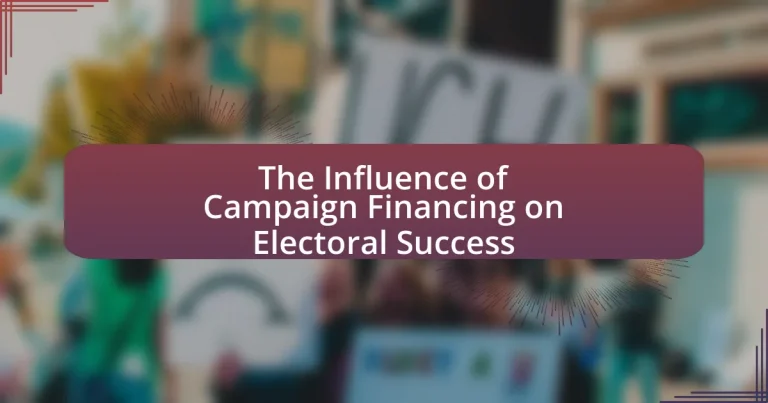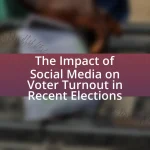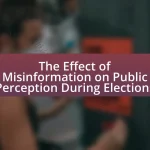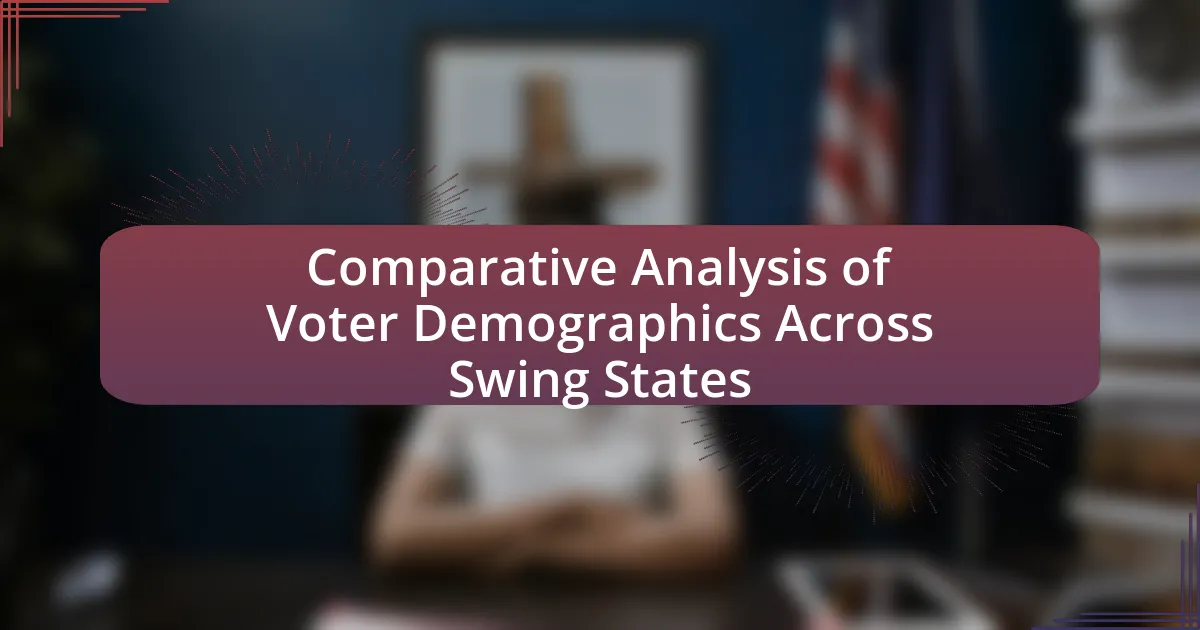The article examines the significant influence of campaign financing on electoral success, highlighting how financial resources impact candidates’ outreach, visibility, and voter engagement. It discusses key components of campaign financing, including contributions, expenditures, and fundraising strategies, and their correlation with electoral outcomes. The article also explores the effects of different financing sources on candidate viability, the legal frameworks governing campaign financing, and the implications for electoral integrity and corruption risks. Additionally, it outlines best practices for candidates to optimize their campaign financing while ensuring fair practices in the electoral process.
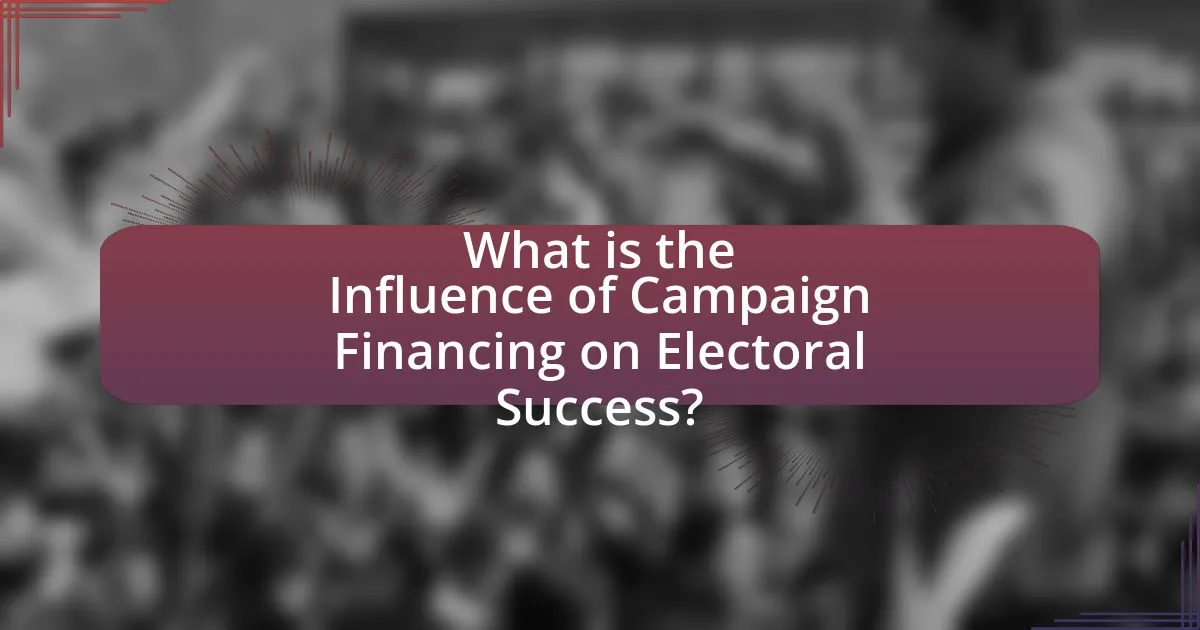
What is the Influence of Campaign Financing on Electoral Success?
Campaign financing significantly influences electoral success by providing candidates with the resources necessary for effective outreach and communication. Candidates with higher financial backing can afford extensive advertising, hire skilled campaign staff, and engage in voter mobilization efforts, which directly correlate with increased visibility and voter engagement. For instance, a study by the Center for Responsive Politics found that candidates who spent more than their opponents were more likely to win their races, highlighting the impact of financial resources on electoral outcomes. Additionally, research published in the American Economic Journal indicates that a 10% increase in campaign spending can lead to a 1% increase in vote share, demonstrating a clear link between financial investment and electoral success.
How does campaign financing impact electoral outcomes?
Campaign financing significantly impacts electoral outcomes by determining the resources available for candidates to promote their messages and engage with voters. Candidates with higher financial backing can afford extensive advertising, outreach efforts, and campaign staff, which increases their visibility and perceived viability. For instance, in the 2020 U.S. presidential election, Joe Biden outspent Donald Trump in key battleground states, contributing to his electoral success. Research shows that candidates who raise more money tend to receive a higher percentage of votes, as demonstrated by a study from the Center for Responsive Politics, which found that candidates who spent more than their opponents won approximately 90% of the time in competitive races. Thus, campaign financing plays a crucial role in shaping electoral dynamics and outcomes.
What are the key components of campaign financing?
The key components of campaign financing include contributions, expenditures, and fundraising strategies. Contributions refer to the financial donations made to a campaign, which can come from individuals, political action committees, or organizations. Expenditures encompass the spending of campaign funds on advertising, staff salaries, and other operational costs. Fundraising strategies involve the methods used to gather financial support, such as events, online donations, and direct mail campaigns. According to the Federal Election Commission, in the 2020 U.S. elections, candidates raised over $14 billion, highlighting the significant role of these components in influencing electoral success.
How do different financing sources affect candidate viability?
Different financing sources significantly affect candidate viability by influencing their ability to campaign effectively and reach voters. Candidates funded by large donations from corporations or wealthy individuals often have access to more resources, enabling them to run extensive advertising campaigns and hire experienced staff. For instance, a study by the Center for Responsive Politics found that candidates who raised over $1 million were more likely to win their elections, highlighting the correlation between financial backing and electoral success. In contrast, candidates relying on small donations or grassroots funding may struggle to compete, limiting their visibility and outreach. This disparity in funding sources creates a competitive advantage for those with access to substantial financial resources, ultimately impacting their chances of winning elections.
Why is campaign financing crucial in modern elections?
Campaign financing is crucial in modern elections because it directly impacts a candidate’s ability to communicate their message and reach voters. Adequate funding allows candidates to invest in advertising, outreach, and mobilization efforts, which are essential for gaining visibility and support. For instance, a study by the Center for Responsive Politics found that candidates who spend more than their opponents are significantly more likely to win elections, highlighting the correlation between financial resources and electoral success. Additionally, campaign financing enables candidates to hire skilled staff and utilize advanced technology for data analysis and voter targeting, further enhancing their competitive edge.
What role does money play in voter outreach and engagement?
Money plays a crucial role in voter outreach and engagement by funding various campaign activities that directly connect candidates with voters. Financial resources enable campaigns to execute strategies such as targeted advertising, organizing events, and employing outreach staff, which are essential for mobilizing voters. For instance, a study by the Center for Responsive Politics found that candidates who spend more on outreach efforts tend to receive higher voter turnout, demonstrating a direct correlation between campaign spending and electoral success. Additionally, campaigns with substantial financial backing can leverage data analytics to identify and engage specific voter demographics effectively, further enhancing their outreach efforts.
How does campaign financing influence media coverage?
Campaign financing significantly influences media coverage by determining the resources available for advertising and public relations efforts. Candidates with substantial financial backing can afford extensive media campaigns, which often leads to increased visibility and favorable coverage. For instance, a study by the Pew Research Center found that candidates who spend more on advertising receive more media attention, shaping public perception and potentially swaying voter opinions. Additionally, media outlets may rely on advertising revenue from these campaigns, creating a potential conflict of interest that can affect the objectivity of their reporting.
What are the legal frameworks governing campaign financing?
The legal frameworks governing campaign financing primarily include federal laws, state laws, and regulations set by electoral commissions. In the United States, the Federal Election Commission (FEC) enforces the Federal Election Campaign Act (FECA), which regulates the financing of federal elections, including contribution limits and disclosure requirements. Additionally, landmark Supreme Court cases, such as Citizens United v. FEC, have shaped the legal landscape by allowing unlimited independent expenditures by corporations and unions, thereby influencing the overall campaign financing environment. State laws also vary significantly, with some states imposing stricter limits on contributions and expenditures than federal law, reflecting a complex regulatory framework that governs how campaigns are funded.
What regulations exist to limit campaign contributions?
Regulations that limit campaign contributions include federal laws such as the Federal Election Campaign Act (FECA) and the Bipartisan Campaign Reform Act (BCRA). FECA, enacted in 1971 and amended several times, establishes limits on individual contributions to candidates, which is currently set at $2,900 per election cycle. The BCRA, passed in 2002, further restricts the use of soft money in federal elections and imposes limits on contributions to political parties. Additionally, many states have their own laws that impose further restrictions on campaign contributions, often varying by state. These regulations aim to reduce the influence of money in politics and promote fair electoral competition.
How do these regulations vary across different jurisdictions?
Campaign financing regulations vary significantly across different jurisdictions, impacting the electoral process and candidates’ success. For instance, in the United States, federal laws impose limits on individual contributions to candidates, while states can establish their own rules, leading to a patchwork of regulations. In contrast, countries like Canada have stricter limits on campaign spending and require public disclosure of donations, which enhances transparency. Additionally, European nations often have public funding mechanisms that support candidates, reducing reliance on private donations. These differences illustrate how the regulatory environment shapes the dynamics of campaign financing and, consequently, electoral outcomes.
How does campaign financing relate to voter perception?
Campaign financing significantly influences voter perception by shaping candidates’ visibility and credibility. High levels of financial support enable candidates to invest in advertising, outreach, and public relations, which enhances their presence in the electoral landscape. Research indicates that candidates who spend more on campaigns tend to be perceived as more viable and competent, as voters often associate financial backing with legitimacy and capability. For instance, a study by the Center for Responsive Politics found that candidates who outspend their opponents are more likely to win elections, highlighting the correlation between campaign financing and voter perception of candidate viability.
What strategies can candidates use to optimize campaign financing?
Candidates can optimize campaign financing by diversifying funding sources, utilizing grassroots fundraising, and leveraging digital platforms for outreach. Diversifying funding sources, such as seeking contributions from individuals, organizations, and small donors, reduces reliance on a single entity and enhances financial stability. Grassroots fundraising, which involves mobilizing supporters to contribute small amounts, can create a sense of community and increase engagement, as evidenced by the success of campaigns like Barack Obama’s in 2008, which raised over $500 million from small donors. Additionally, leveraging digital platforms allows candidates to reach a broader audience efficiently, as online fundraising tools can facilitate quick donations and enhance visibility. These strategies collectively improve a candidate’s financial resources and increase their chances of electoral success.
What are the effects of campaign financing on electoral integrity?
Campaign financing significantly undermines electoral integrity by creating disparities in political influence and access to resources. Wealthy candidates or those backed by affluent donors can dominate the political landscape, leading to a system where electoral outcomes are swayed by financial power rather than democratic principles. For instance, a study by the Brennan Center for Justice found that candidates who spend more than their opponents are often more likely to win, highlighting the correlation between campaign spending and electoral success. This financial advantage can result in policies that favor donors over constituents, eroding public trust in the electoral process and diminishing the principle of equal representation.
How does excessive financing lead to corruption risks?
Excessive financing leads to corruption risks by creating an environment where financial contributions can unduly influence political decisions and actions. When candidates or political parties receive large sums of money, they may feel obligated to favor the interests of their donors over the public good, leading to potential quid pro quo arrangements. Research indicates that in systems with high campaign contributions, the likelihood of corruption increases, as seen in studies by the Brennan Center for Justice, which highlight that states with fewer campaign finance regulations experience higher levels of corruption. This correlation underscores how excessive financing can distort democratic processes and erode public trust in governance.
What measures can be taken to ensure fair financing practices?
To ensure fair financing practices in electoral campaigns, implementing strict regulations on campaign contributions and expenditures is essential. These regulations can include limits on the amount individuals and organizations can donate, as well as transparency requirements that mandate the disclosure of all contributions and spending. For instance, the Federal Election Commission in the United States enforces contribution limits and requires candidates to report their financial activities, which helps to prevent corruption and promotes accountability. Additionally, public financing options can be introduced to level the playing field, allowing candidates with fewer resources to compete effectively. Studies have shown that states with public financing systems, like Arizona and Maine, have seen increased candidate diversity and voter engagement, demonstrating the effectiveness of such measures in promoting fair financing practices.
What best practices should candidates follow for effective campaign financing?
Candidates should prioritize transparency and compliance with campaign finance laws to ensure effective campaign financing. Maintaining clear records of all contributions and expenditures fosters trust among voters and adheres to legal requirements, as evidenced by the Federal Election Commission’s regulations that mandate detailed reporting of campaign finances. Additionally, candidates should diversify their funding sources to mitigate risks associated with reliance on a single donor or group, which can lead to potential conflicts of interest. Research indicates that campaigns with a broad base of small donors often experience greater voter engagement and support, enhancing their electoral success. Lastly, leveraging digital fundraising platforms can increase outreach and efficiency, as studies show that online donations have surged, accounting for a significant portion of campaign contributions in recent elections.
